U.S. military: Airstrikes against ISIS won't save key city of Kobani
By Holly Yan, Josh Levs and Elise Labott, CNN, Re-posted by Abdulgafar Abdulrauf Adio
(CNN) -- U.S. airstrikes "are not going to save" the key Syrian city of Kobani from being overtaken by ISIS, said Pentagon spokesman Rear Adm. John Kirby.
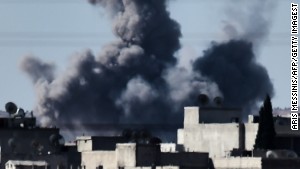
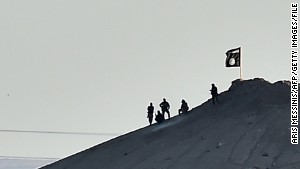
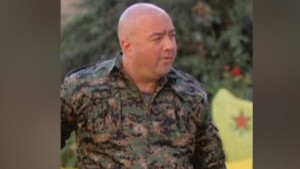
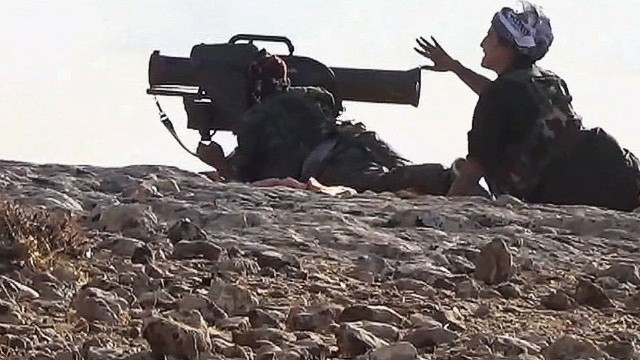
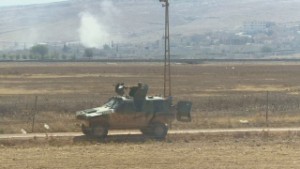
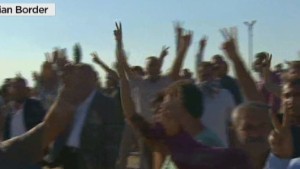
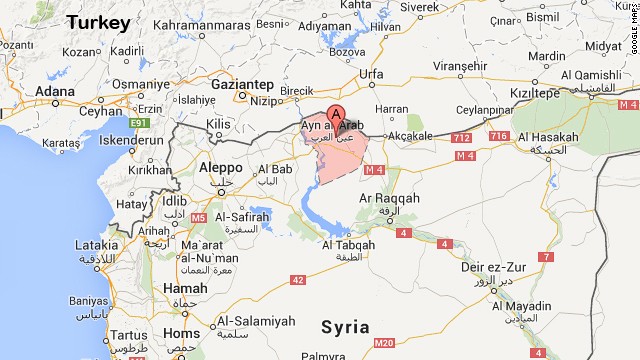
(CNN) -- U.S. airstrikes "are not going to save" the key Syrian city of Kobani from being overtaken by ISIS, said Pentagon spokesman Rear Adm. John Kirby.
"I think we all should be steeling ourselves for that eventuality," he told reporters in a daily briefing Wednesday.
"We are doing everything
we can to halt" ISIS' progress against the town, but airstrikes alone
cannot stop the Islamist militants, Kirby added.
"We've been very honest
about the limits of air power here. The ground forces that matter the
most are indigenous ground forces, and we don't have a willing, capable,
effective partner on the ground inside Syria right now -- it's just a
fact," he said.

Pentagon: Airstrikes won't save Kobani

Why is Kobani so important to ISIS?

American helps Kurds fight ISIS
The greater U.S. strategy, Kirby said, is to degrade ISIS' ability to sustain itself.
Several senior U.S. administration officials said Kobani will soon fall to ISIS, which calls itself the Islamic State.
They downplayed the importance of it, saying the city is not a major U.S. concern.
But a look at the city
shows why it would mark an important strategic victory for the
militants. ISIS would control a complete swath of land between its
self-declared capital of Raqqa, Syria, and Turkey -- a stretch of more
than 100 kilometers (62 miles).
As Time.com put it,
"If the ISIS militants take control of Kobani, they will have a huge
strategic corridor along the Turkish border, linking with the terrorist
group's positions in Aleppo to the west and Raqqa to the east."
Staffan de Mistura, U.N.
special envoy for Syria, warned of the horrors ISIS could carry out
against the people of Kobani -- horrors it has carried out elsewhere.
"The international community needs to defend them," he said. "The
international community cannot sustain another city falling under ISIS."
The terrorist group
claimed it had downed at Iraqi army helicopter in Baiji. Photographs
posted to an ISIS website show smoke and fire around an aircraft, which
is then seen completely charred on the ground.
A truck bomb driven by
ISIS exploded near the center of Kobani. Two civilians and a fighter
inside the city described it as huge. The target was a security forces
building, they said.
However, Kurdish official Idriss Nassan told CNN, the truck did not reach its intended target and detonated early.
Coalition batters ISIS positions with airstrikes
A U.S.-led coalition has
been pounding ISIS positions in the region with airstrikes for a few
weeks, conducting nine airstrikes in Syria and three in Iraq on
Wednesday.
In Syria, eight strikes
near Kobani destroyed five ISIS armed vehicles, a supply depot, a
command and control compound, a logistics compound, and eight occupied
barracks, according to a statement from U.S. Central Command.
"U.S. Central Command
continues to monitor the situation in Kobani closely. Indications are
that Kurdish militia there continue to control most of the city and are
holding out against ISIL," it read.
Overnight into Thursday, the Australian Air Task Group in the Middle East attacked its first target in Iraq: an ISIS facility.
A former head of the British Armed Forces doubted the wisdom of coalition airstrikes -- alone.
"The rules of war are
well-written on this, and well-established. I've been saying it, others
have been said it," retired Gen. David Richards told CNN's Christiane
Amanpour.
"Wars aren't ever going
to be won from the air alone. They're a vital part of success, but don't
expect a guy in an airplane to be able to seize and hold terrain," he
said.
At least 45 ISIS
fighters have been killed in the strikes, though the number may be much
higher, according to the London-based Syrian Observatory for Human
Rights, which gets information from sources on the ground.
The most recent strikes,
late Tuesday into Wednesday, included nine in Syria, the U.S. military
said. Six were in the Kobani area and destroyed an ISIS armored
personnel carrier, four armed vehicles and two artillery pieces, U.S.
Central Command said. U.S. and coalition forces also conducted five
airstrikes against ISIS in Iraq, the military said.

Woman: I am proud to fight, kill ISIS

ISIS forces enter Kobani, sources say

Kurds battle ISIS in key border town
The primary goal of the
aerial campaign is not to save Syrian cities and towns, the U.S.
officials said. Rather, the aim is to go after ISIS' senior leadership,
oil refineries and other infrastructure that would curb the terror
group's ability to operate -- particularly in Iraq.
Saving Iraq is a more
strategic goal for several reasons, the officials said. First, the
United States has a relationship with the Iraqi government. By contrast,
the Obama administration wants Syrian President Bashar al-Assad to step
down.
Another reason: The
United States has partners on the ground in Iraq, including Iraqi forces
and Kurdish fighters known as Peshmerga.
According to a senior
military official, U.S. military advisers are now working with Iraqi
troops at the brigade level, not just in the joint command centers in
Irbil and Baghdad. The advisers are not in combat situations, but the
move means they are less removed than before, said the source, who spoke
on the condition of anonymity.
"Our strikes continue
alongside our partners. It remains a difficult mission. As I've
indicated from the start, this is not something that is going to be
solved overnight," President Barack Obama told reporters Wednesday.
"We're confident that we
will be able to continue to make progress in partnership with the Iraqi
government, because ultimately it's going to be important for them to
be able to, with our help, secure their own country, and to find the
kind of political accommodations that are necessary for long-term
prosperity," he said.
Local fighters
apparently made some headway Wednesday morning, when some ISIS militants
in Kobani were pushed back to the city's perimeter, Kurdish official
Idriss Nassan said.
The battles have been
bloody. More than 400 people have been killed in the fight for Kobani
since mid-September, the Syrian Observatory for Human Rights said. The
opposition group said it has documented the deaths of 219 ISIS
jihadists, 163 members of the Kurdish militia and 20 civilians.

Map: Kobani (Ayn al-Arab)
U.S. plan against ISIS: Iraq first, then Syria
The United States' goal
is to first beat back ISIS in Iraq, then eliminate some of its
leadership and resources in Syria, the U.S. administration officials
said.
If all goes as planned, by the time officials turn their attention to Syria, some of the Syrian opposition will be trained well enough to tackle ISIS in earnest.
Washington has been
making efforts to arm and train moderate Syrian opposition forces who
are locked in a fight against both ISIS and the al-Assad regime.
Training Syrian rebels could take quite a long time.
"It could take years, actually," retired Gen. John Allen said last week. "Expectations need to be managed."
The United States also
wants Turkey to do more, the officials said. The administration is
urging Turkey to at least fire artillery at ISIS targets across the
border.
But the Turkish
reluctance, the officials say, is wrapped up in the complex relationship
with their own Kurds and the idea that they don't want to help any of
the Kurds in any way.
CNN iReporter Chelsea Smith sent photos,
taken Tuesday night in Istanbul, showing clashes between police and
protesters in the predominately Kurdish neighborhood of Tarlabasi.
While outside the Parliament building in London on Wednesday, Kurdish activists protested for stronger action.
"We want more
airstrikes. We want a clear message. There is a humanity that's
threatened and the massacre is about to happen, and we have to act very
immediately and prompt, and intensify our attacks on them," said Rebar
Hajo, a protester, and member of the Democratic Union Party (PYD) in
Syria.
Hundreds of strikes, millions of dollars
The United States and its allies have made at least 271 airstrikes in Iraq and 116 in Syria.
The cost? More than $62 million for just the munitions alone.
The effect? Negligible, some say, particularly in Iraq.
One by one, the cities have fallen to ISIS like dominoes: Hit, Albu Aytha, Kubaisya, Saqlawia and Sejal.
And standing on the western outskirts of Baghdad, ISIS is now within sight.
"That's DAIISH right over there," said Iraqi Brig. Gen. Ali Abdel Hussain Kazim, using the Arabic acronym for ISIS.
The militants' proximity
to the capital is cause for concern. If the terror group manages to
infiltrate and launch attacks in Baghdad or its green zone, the results
could be disastrous.
Kazim said ISIS has not
been able to move from eastern Anbar province to Baghdad. But another
brigadier general said that's not even the biggest threat.
The real danger to the Iraqi capital, Brig. Gen. Mohamed al-Askari said, is from ISIS sympathizers in the city.
"They are a gang," he
said. "They deploy among civilians. They disappear into the civilian
population and camouflage themselves."










0 comments:
Post a Comment